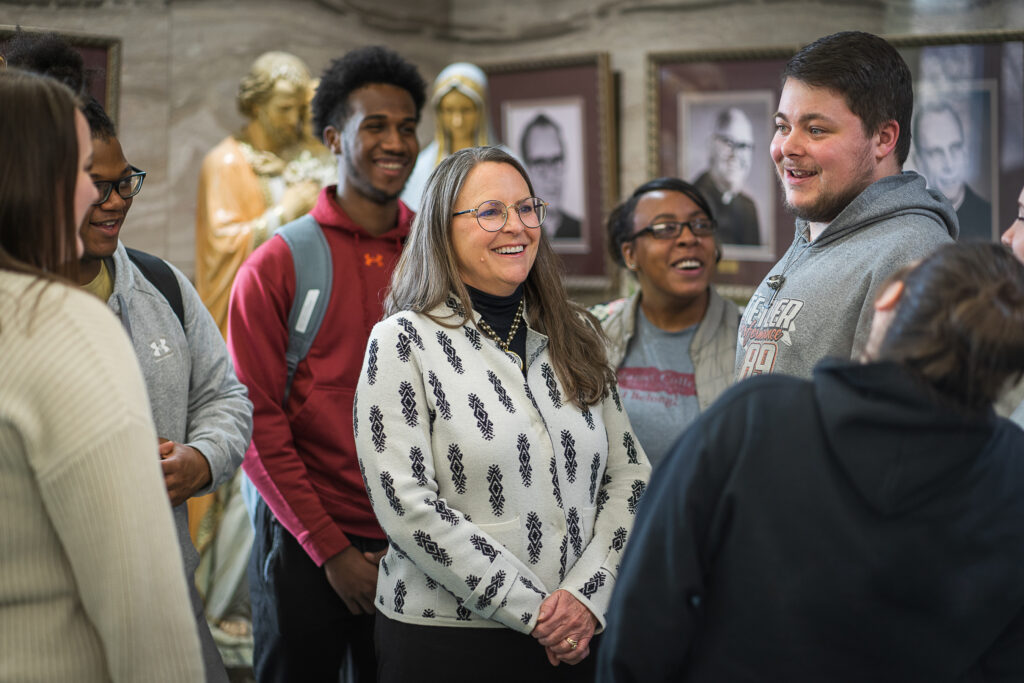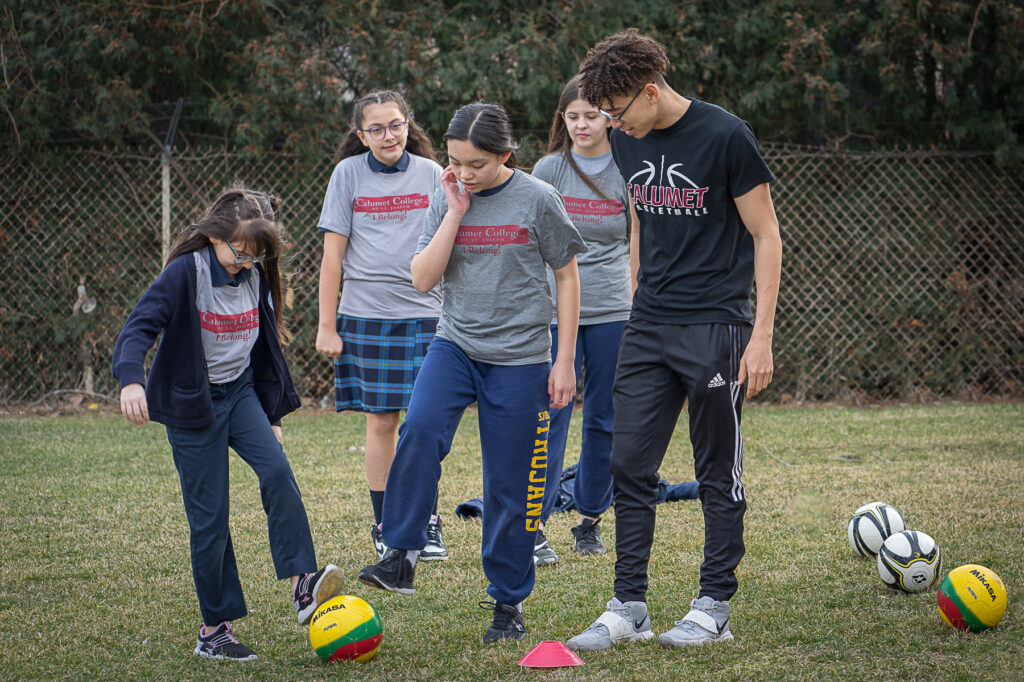2022 Annual Report:
On-Campus Summer Programs Serve as Community Outreach
and College and Career Prep
Summer camp often signifies canoeing, horseback riding and campfires. These days the concept can encompass a lot more: enrichment programs focused on activities as varied as STEM labs, media arts, emotional resiliency, equity and entrepreneurship all geared toward helping young people prepare for college and careers and rewarding and engaged lives.
With support from Lilly Endowment, Indiana colleges and universities are ramping up their summer camp offerings for youth. In 2021, the Endowment launched Indiana Youth Programs on Campus (IYPC), a multiyear, $31 million initiative aimed at helping Indiana colleges and universities create new and expand existing educational and experiential on-campus summer programs or camps for young people. On-campus summer camps are a vital means of outreach for colleges and universities, especially as they seek to better serve more first-generation college students, students from communities of color and students from families with limited resources.
The Endowment’s initiative is, in part, a response to the significant decrease in the number of Hoosiers pursuing post-secondary education. In 2015, 65 percent of Indiana high school graduates were pursuing some form of post-secondary education. That rate has dropped steadily since. By 2020, only 53 percent of Hoosiers were pursuing post-secondary education the year after high school graduation.
To help interested institutions develop high-quality camp programs, the IYPC initiative included a planning phase, with grants of up to $50,000 available to help underwrite the costs associated with camp planning. Those plans then became the basis for proposals the institutions submitted for implementation grants of up to $1 million per college or university. Through the initiative, the Endowment awarded 27 planning grants and 35 implementation grants.
Time to rethink, reimagine
Calumet College of St. Joseph in Whiting, Ind., used a $50,000 planning grant to rethink its approach to summer camps. The private college of nearly 700 students had a history of holding summer camps for young people in the northwest region of the state, but the COVID-19 pandemic led to a two-year shutdown. The IYPC planning grant reinvigorated the camps program, says Calumet President Amy McCormack (below).

“It was great to have the opportunity to engage faculty in revitalizing former camps and discussing ideas for new camps to serve our youth,” McCormack says. “It allowed us to take an institutional approach.”
As part of its planning phase, Calumet held three pilot camps in June and July 2022. One focused on reading enrichment for elementary students. Another was aimed at helping middle schoolers learn physical and mental resiliency. The third was a media camp for high school students.
For its pilot camps, Calumet turned to its student body for counselors. “We wanted to hire students to be role models for the young people coming to the camps,” McCormack says, “and we wanted to be able to pay them competitive wages. The planning grant allowed us to do that, as well as to hire administrative help.”
One of Calumet’s counselors was Mackenzie Pickens, an education major. She worked with a group of the youngest campers in the four-week reading camp. Because her campers were first graders, there wasn’t a lot of attention paid to college life, Pickens says, but she gave them a sense of being at summer camp by setting up beach chairs and a tent in her classroom. “The kids came in excited every day,” Pickens says. “And it was a great experience for us as teachers.”
Tabitha De Lion, a senior at Calumet with a double major in digital and studio arts and English and media communications, worked with older students in the summer media camp, a week-long intensive session focused on digital and media literacy and social justice. As part of their experience, says De Lion, the campers met with faculty members in their classrooms and experienced what it would feel like to be treated like a college student. “Everyone was fully engaged,” she says. “At the end, when we asked if they would come back again, everyone said they would.”
Dylan Hill (below) had a similar experience. A Calumet basketball player and campus leader, he was a student counselor in the camp for middle schoolers. Created in collaboration with Maroon Village, a sports performance program in nearby Gary, the camp used yoga, breathwork and mindfulness, to teach resiliency, an important component of success not only in sports but in school and life as well. At the same time, the campers got a sense of the community at Calumet, Hill says. “They were in our new gym and outside on the campus. They loved it.”

The college learned a lot by having the pilot camps, according to Ginger Rodriguez, Calumet’s executive director of grants and strategic initiatives. “We learned more about timing outreach to the community, developing partnerships, engaging with families, and evaluating youth programs.”
The result of the planning was a proposal that led to a three-year, $565,495 implementation grant. For its 2023 summer program, Calumet will not only be repeating the themes of the three pilot camps, but it also will add earth camp, activities exploring the science of sports, a program focused on Shakespeare, and a math jump start program. While continuing its partnership with Maroon Village, the college is developing new collaborations with elementary schools in the Catholic Diocese of Gary, the Gary Shakespeare Company and the Dunes Learning Center, an education partner of the Indiana Dunes National Park.
Such an ambitious program was possible because the planning grant enabled Calumet to be intentional about developing its camps. “With funding to pay faculty, we were able to develop specific curricular structures and the assessment instruments that went with them,” Rodriguez says.
One of the unexpected outcomes of the camps was a chance to connect with parents, many of whom stayed on campus during their children’s camp sessions. As a result, the college’s librarian is developing resources that align with each of the camps that Calumet will offer in summer 2023. “We’ve also decided to have parent coffees,” Rodriguez says, “which will give us an opportunity to talk not only about Calumet College, but college in general and how they get from wherever their children are now to where they want them to go.”
Listening and responding to youth
 At DePauw University in Greencastle, Ind., a planning grant was vital to the university’s ability to develop a successful implementation grant proposal, according to President Lori White (right). Through the initiative, DePauw received $49,700 for planning and a $1 million implementation grant to fund three years of a multi-faceted summer camp program set to begin in 2023.
At DePauw University in Greencastle, Ind., a planning grant was vital to the university’s ability to develop a successful implementation grant proposal, according to President Lori White (right). Through the initiative, DePauw received $49,700 for planning and a $1 million implementation grant to fund three years of a multi-faceted summer camp program set to begin in 2023.
“We have not had a robust cadre of youth camps on our campus,” White says of the university, which has more than 1,750 students. “The planning grant enabled us to survey potential participants and our community as to what kind of youth camp would best align with student passions, our strategic plan and our institutional values.”
DePauw introduced a new strategic plan in spring 2022 that called for expanding its longstanding College of Liberal Arts to The College of Liberal Arts and Sciences. It also included a commitment to create a school of business and leadership and a multi-faceted media school, as well as a focus on institutional equity. All those elements became foundational to the planning for DePauw’s summer camp program, which will include sessions on science and technology; creativity and innovation; art and performance; business and leadership; and equity, sustainability and social change.
Equally important, White says, was how the planning grant gave the university the ability to survey 1,700 high school students to determine what would be of interest to them. Based on the survey results, university leaders decided to offer two-day camps rather than more traditional week-long sessions. Many high school students have summer jobs or are caring for younger siblings and couldn’t commit to more than a two-day program.
The survey also revealed a need to educate students about the myths and realities of college life. That led to a sixth summer offering: College 101. It will cover such topics as how to prepare for college, how to be successful as a college student and how to ensure success after graduation.
“We have a particular interest in first-generation students and students who want to go to college but may not know how to get there,” White says. “We wanted to make sure that what we offered, and our program length, aligned with the students whom we most want to attract to our campus.”
The planning grant enabled White and DePauw faculty and staff members to consider the best way to design and deliver a high-quality youth program. “I’ve often seen grant opportunities and thought, ‘That’s a great idea.’ And yet, who has the time? The planning grant allowed us to take the time and have the resources for thoughtful, intentional planning,” White says.
DePauw also sees this as an opportunity to connect with parents, families and our community-based organization partners. “DePauw’s summer experiences will include sessions tailored to families in addition to the programs offered to students. We want to help families navigate the college admission process. ”
In the end, White adds, the benefit of the IYPC initiative is that it is encouraging individual colleges and universities to showcase what they have to offer and what higher education has to offer young students throughout the state. “The net positive result of our camps and all the camps sponsored by the Lilly Endowment initiative is that hopefully when these young people leave any of our campuses, they can see themselves as college students.”
Indiana Youth Programs on Campus (IYPC) is a Lilly Endowment initiative designed to help Indiana colleges and universities in their efforts to create new or expand and enhance existing high-quality, on-campus programs for Hoosier youth, ages 5–18.